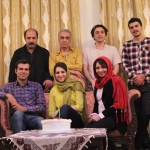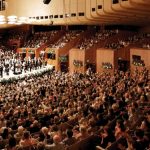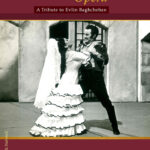The Motherland Orchestra staged the first concert since the outbreak of the pandemic under the baton of Nezhat Amiri. The orchestra went on stage on December 23-24, 2021 in memory of Rouhollah Khaleghi and Golnoush Khaleghi at Vahdat Hall, Tehran, Iran. Since the pandemic outbreak, concerts were held online and restrictions were imposed on in-person concerts.
Tag Archives: Mehrdad Delnavazi
Latest posts
- Transition to Enlightenment: Six Lectures on Mozart’s String Quartets (5)
- Nasser Masoudi: The Voice of Gilan and a Legacy of Iranian Music
- Farhad Poupel: The Voice of the Shahnameh in the Orchestras Around the World
- Five Major Myths About Mozart’s Life
- Bahma Rajabi Passed Away!
- Reza Vohdani; Unveiling unpublished works, preservation of Iranian classical music
- Ahmad Pejman Passed Away!
- Timeless or Timely: The Role of Historical Context in Defining Artistic Value
- Leading the Charge in Censorship
- The Legacy of Khosrow Jafarzadeh
- Transition to Enlightenment: Six Lectures on Mozart’s String Quartets (4)
- Fereydoun Shahbazian, An Iranian Musical Icon Passed Away
From Past Days…

HarmonyTalk Celebrates 11th Anniversary
April 6 marks the anniversary of launching HarmonyTalk.com. Back in 2004, HarmonyTalk was rather a blog dedicated to music. Gradually, however, it found its way to becoming a more sophisticated journal with an intensive but not exclusive concentration on classical music.

Layla Ramezan, Iranian Pianist
Iranian pianist Layla Ramezan has always sought to create a connection between her Persian origin and the contemporary music which she encounters daily. Sound, phrasing, a particular sense of rhythm and a refined understanding of the “time of musical development” are the foremost qualities of her interpretations. Her musical and pianistic education began in Tehran at the age of 8 with Mostafa-Kamal Poortorab. Having moved to Paris and received a scholarship from Albert Roussel Foundation, she integrated the classes of Jean Micault and Devi Erlih at the Ecole Normale de Musique de Paris Alfred Cortot, where she received a Diplôme de Virtuosité in piano performance and chamber music.

The Role of Arts in Development of Societies
Mr. Mohsen Ghanebasiri, author and critic in the field of economy, culture and arts, as the next speaker, highlighted the role of arts, specially the music, in development of societies: “As far as the individual upbringing is concerned, a newborn baby is absolutely dependent. The relation between the baby and the parents is based on orders. There is lots of relativity in these orders; therefore, they are political orders. In the economy, however, the relations are mutual and based on common logic; hence, the formation of the concepts of democracy and individuality.

Harmony in the Iranian Music (II)
One of his works was the translation of Harmony, which was carried out with the help of Mozayyan al-Dowleh, and included a pamphlet based on which he used to teach the subject to the students of the school of music; the pamphlet was never published. It was, in fact, a kind of simple harmony for the piano with no quadriads, it rather featured the engagement of both the right hand and the left hand which was being taught at the music school for the first time. Salar-Mo’azez also composed military marches and hymns for schools, which he harmonized to be performed and piano. Likewise, he used to compose for military orchestras.

Shaahin Mohajeri Wins UnTwelve Composition Competition
UnTwelve Non-profit Organization announced the results of its 2014/2015 composition competition on January 28, 2015. Shaahin Mohajeri, an Iranian Tonbak player, microtonalist, acoustician and composer, was awarded the second prize for his piece “Castle of Babak.”

Parviz Meshkatian’s Heart Beat for People (I)
Amidst the popularity of traditionalism in the Iranian music, Parviz Meshkatian (1955- 2009) moved from Neyshabur to Tehran. He learnt to play Santour and became educated in the Radif of Iranian music at the Centre for Preservation and Promotion of Music which was at the forefront of promoting the return to musical traditions. Despite his studies at a centre which promoted the use of the phrase “traditional music” in Iran, Parviz Meshkatian emerged as a creative artist whose innovative and unique ideas attracted the admiration of Iranian artists and people from different walks of life. This article studies the reason behind Meshkatian’s deviation from the wrong approach of traditionalism strongly promoted by the Centre and argues that apart from the issue of theory of Iranian music, he can be considered as Ali Naqi Vaziri’s successor.

Leading the Charge in Censorship
Davoud Pirnia, writer and musicologist was the founder of “Golha” (Flowers of Persian Song and Music) programs on Tehran Radio (1956-1966). He received his early education from his father, Hassan Pirnia (Moshir al-Douleh), and several tutors of the time (Taraghi, interview, July 1989) and continued his studies at Saint Louis School in Tehran and then in Switzerland and graduated in law. While studying law, Pirnia got acquainted with European classical music. Upon returning to Iran, he was employed by the Ministry of Justice and founded the Lawyers’ Guild. Then he was transferred to the Ministry of Finance and established the Department of Statistics in this ministry. Later, he became the head of the state inspection office at the Prime Ministry; he was, then, promoted to the position of the Deputy Prime Minister (Navab Safa, interview, August 1999)

Rare documents of Tehran Opera Company published in Europe
The year 2020 marks the 10th anniversary of Evlin Baghcheban’s death. She played a crucial role to promote opera and choral music in Persia (Iran). Born to an Assyrian-French family in Turkey, she studied singing and piano at the Ankara State Conservatory. In 1950 Evlin married the Persian composer and fellow student Samin Baghcheban and moved to Tehran.

Polyphony in Iranian Music (V)
In addition to the above-mentioned, polyphony can be also formed when a melody is performed by several singers in different ambiances or different sound registers according to their physiologic abilities. An example of this has been performed in rituals of Khanqah of Ghaderi darawish of Mahabad[i].

Interview with the Makers of the New Qeychak (II)
Regarding the classification of a new instrument in an instrument family, one can point to a number of fundamental issues, one of the most obvious of which is the instrument’s visual features. If we look at how the new instrument has changed compared to its historical versions, the set of visual elements that link the instrument to the Qeychak family becomes apparent. But other characteristics such as the geometric dimensions of the instrument, characteristics of the instrument’s various parts and how they relate to each other, its systematic performance, its sound range (compared to modern versions), the material and color of the sound, the way it is played and the like, can be considered in order to classify the instrument in the Qeychak family.